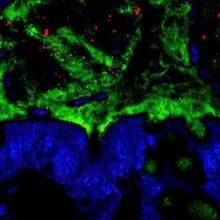The emulsifiers found in processed foods can alter the composition of gut microbiota and trigger intestinal inflammation that, in turn, may promote the development of inflammatory bowel disease and metabolic syndrome, Dr. Benoit Chassaing, PhD, of Georgia State University Institute for Biomedical Sciences, and his colleagues report Feb. 25 in Nature.
The research team fed mice polysorbate 80 and carboxymethylcellulose, two commonly used emulsifiers, at doses replicating those found in processed foods. Emulsifier consumption changed the composition of the gut microbiota in the mice, resulting in a proinflammatory state. The bacteria were able to digest and infiltrate the intestine’s mucosal layer and the altered bacterial species expressed more flagellin and lipopolysaccharide, which can activate proinflammatory gene expression by the immune system.
The bacterial changes triggered chronic colitis in mice genetically prone to the disorder. In mice with normal immune systems, low-grade intestinal inflammation resulted, and metabolic syndrome was noted.
Transplanting the microbiota from mice fed emulsifiers to germ-free mice also transferred some parameters of low-grade inflammation and metabolic syndrome, indicating a central role for the microbiota in mediating the adverse effect of emulsifiers.


